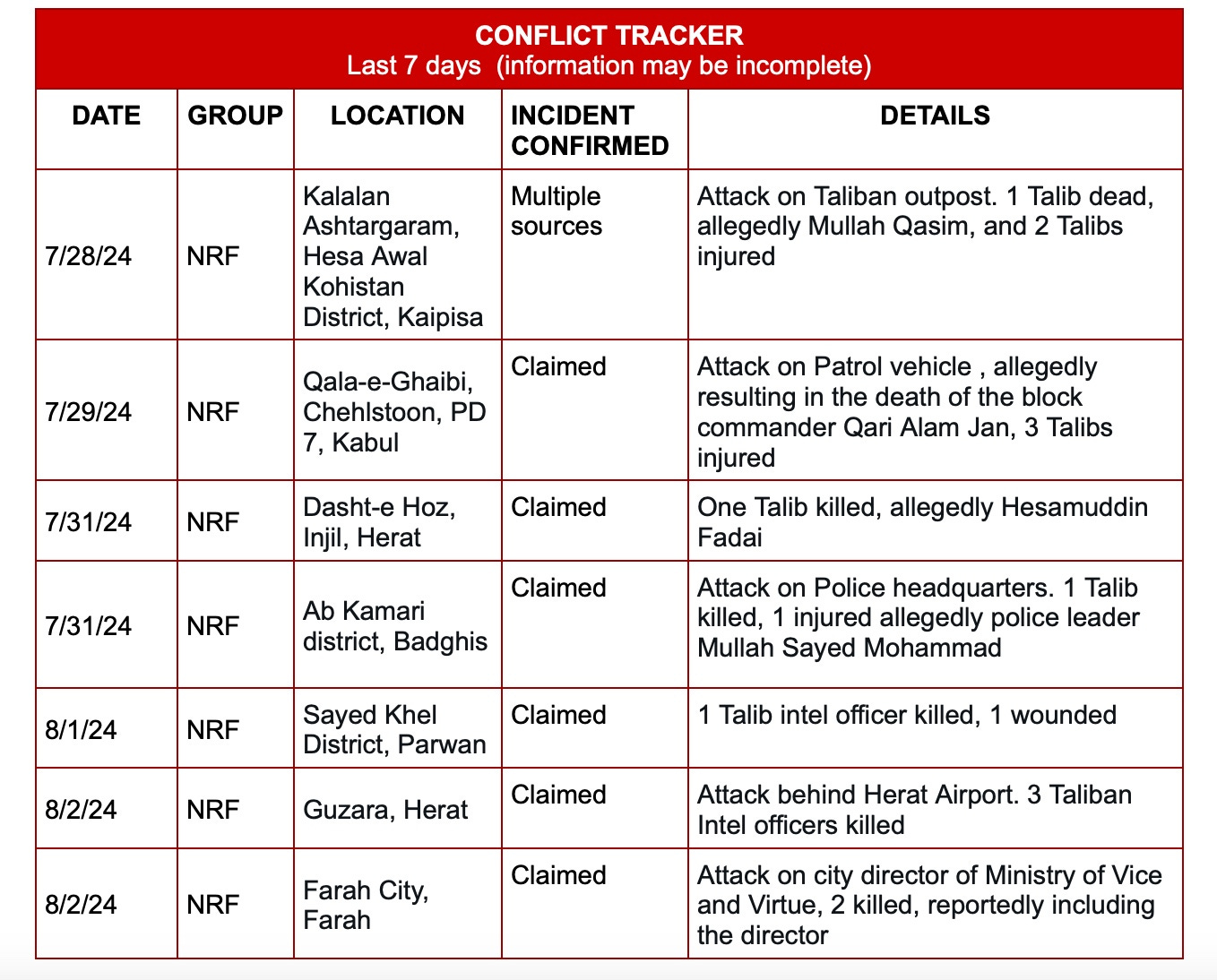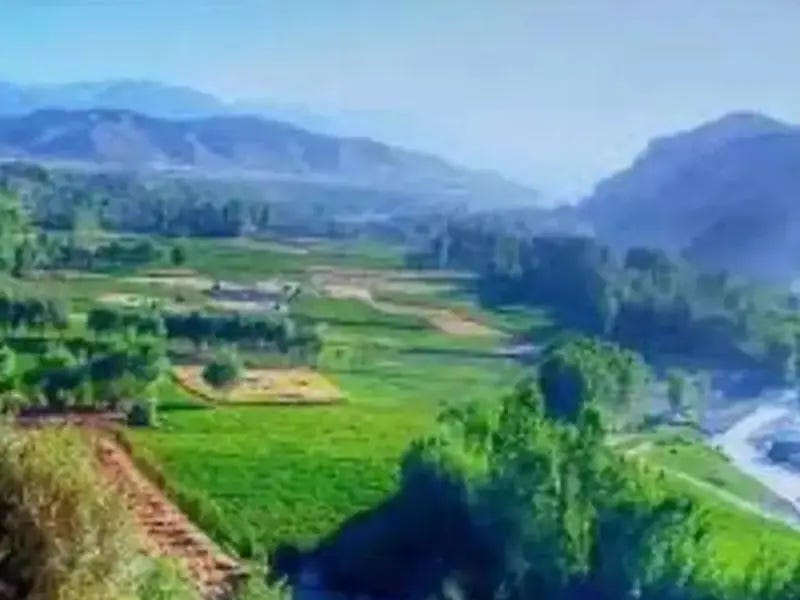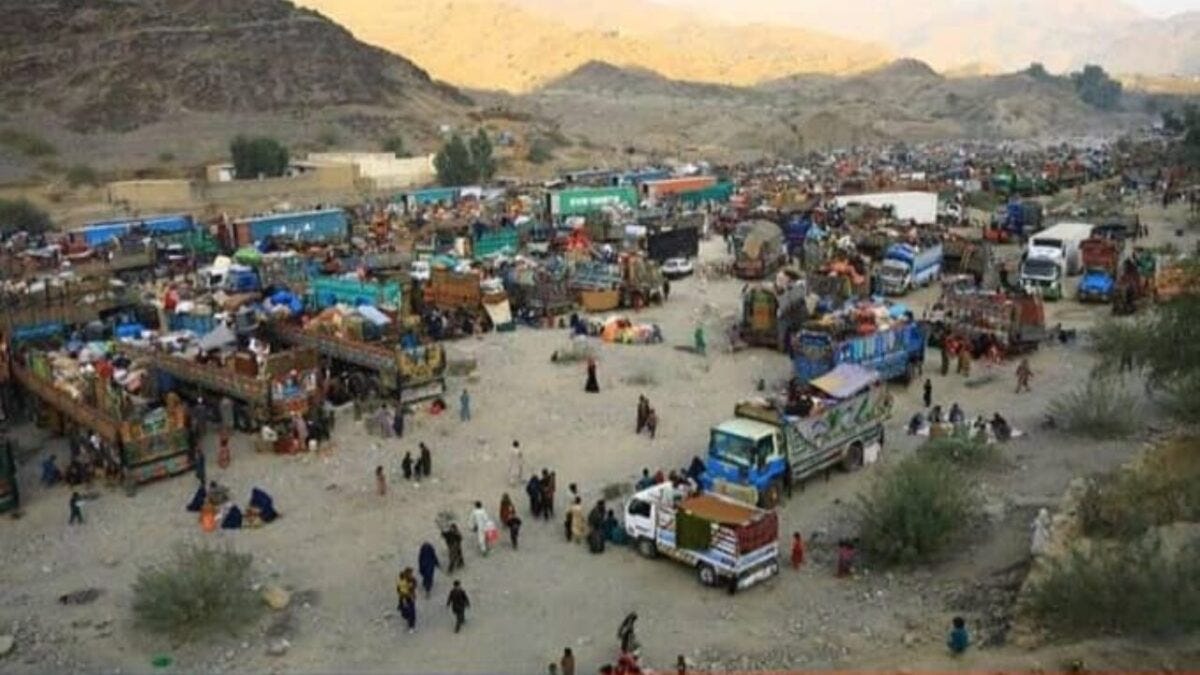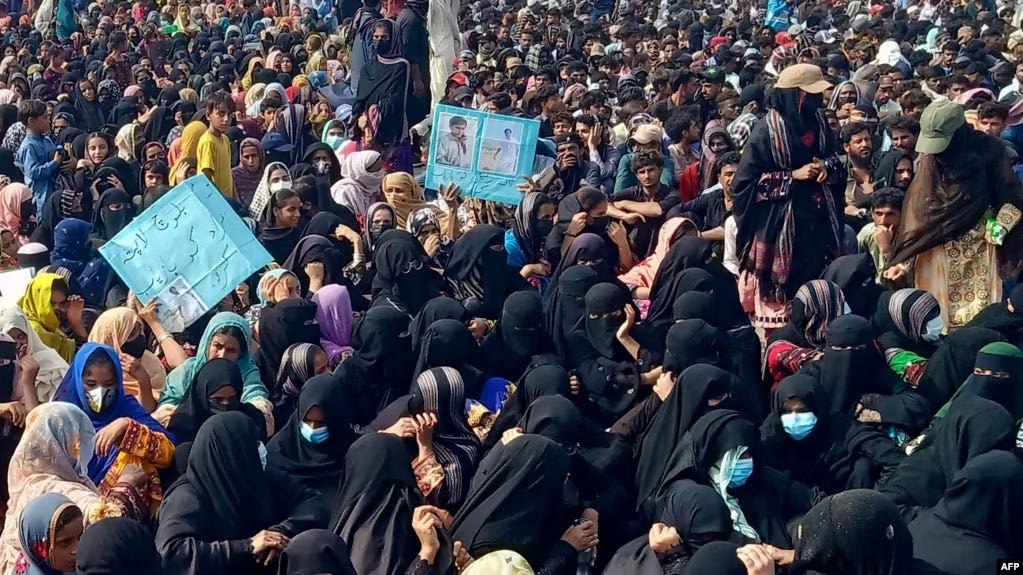The Week of July 29-August 4
Security and Conflict
Attack on Taliban Vehicle in Maidan Wardak – An attack on a vehicle carrying Taliban employees in Kabul resulted in the death of seven people and several injuries. The incident occurred on Wednesday when unknown gunmen opened fire on a vehicle transporting at least 30 employees from various Taliban departments. The Taliban have not commented, and ISKP has claimed responsibility.
Clashes in Jowzjan – On Monday, the Taliban attacked local residents in Darzab, Jowzjan, killing one person and injuring four. This follows three years of local dissatisfaction with the Taliban, who had previously taken over the former police chief's house and used it as their base. Reports indicate ongoing harassment, including sexual abuse of girls. Tonight, locals protesting Taliban abuses were met with violence from the Taliban, who also tried to conceal an internal conflict resulting in the death of one member.
ANSF Member Tortured – The Taliban arrested and tortured Burhanuddin Samadi, a former military officer from Baghlan who had previously served in Bamiyan and fled to Iran after the political change. He returned to Afghanistan two months ago, was detained, tortured, released, and then re-arrested 15 days ago.
Talib Killed in Nangarhar – A Taliban official, Mawli Amanullah, from the Ministry of Vice and Virtue, was gunned down in the Landi Khyber area of Mohammand Dara district, Nangarhar province. He served as a district official in the same district.
Human Rights and Civil Liberties
Report on killing of Former ANSF – According to a report by 8am, over the past three years, the Taliban have persistently detained and executed former military personnel and civilians in Afghanistan. In the past month alone, 200 people were detained across 14 provinces, with eight executed. The report highlights widespread torture, humiliation, and severe repression, with many detainees subjected to violence and arbitrary punishment. The situation is exacerbated by strict media censorship and severe human rights violations.
Violence at Money Changer Protest in Herat – On Tuesday, money exchangers in Herat protested outside the Taliban governor's office, but the protest ended after the Taliban beat the demonstrators. The closure of exchange shops has persisted over the past several months, with nearly 80% shut down by the Taliban. The Taliban-controlled central bank is demanding substantial financial guarantees for issuing licenses, leading to the closure of 500 exchange shops in Herat.
Former Government Employees Protest Unpaid Pensions – On Wednesday, retired former government employees peacefully protested outside the Taliban's finance ministry in Kabul, demanding unpaid salaries. The Taliban abolished pensions in April, ignoring prior protests. The retirees expressed frustration over being neglected for several years.
Arrests for Flag Day – On Monday in Paktika, the Taliban arrested at least 40 people for possessing images of the flag of the republic and listening to patriotic music. The arrests occurred two days before July 28th, following inspections of smartphones. The detainees were taken to an unknown location as Flag Day approached.
Floggings — In Khost province on Thursday, the Taliban publicly flogged nine individuals. Sentences varied, with some receiving 35 or 39 lashes and prison terms ranging from six months to three years.
Internal Politics
Taliban will not Accept Documents from Afghan Consulates not Under their Control – The Taliban Ministry of Foreign Affairs announced on July 30 that it will no longer accept or take responsibility for consular services provided by Afghanistan’s diplomatic missions in several European countries, Canada, and Australia. The ministry stated it would not recognize documents from these missions and urged Afghan diplomatic missions to coordinate with Kabul. Afghan Embassies in Tajikistan, the UK, Belgium, the EU, Canada, the US, and Australia condemned the Taliban's statement, asserting they will continue to work for Afghan citizens. However, several consulates' websites were taken offline on Friday. The Taliban demands that consular services, including passport issuance and visa stickers, be handled by embassies under their control. No country has formally recognized the Taliban government, which has appointed ambassadors to several neighboring countries. For more information please see the spotlight analysis.
Foreign Fighters Being Relocated - Local sources in Badakhshan reported the Taliban's recent relocation of foreign fighters, mainly Central Asians, to specific areas in northern Afghanistan. Tajikistani nationals were largely disarmed and moved to certain districts, while Uzbek nationals, still armed, were relocated near airports in Takhar, Kunduz, and Balkh. The move may be linked to a potential deal with Russia, aimed at controlling regional terror groups in exchange for support and removal from the list of terrorist organizations.
Pro-Taliban Meeting Held in Kabul – A pro-Taliban meeting was held in Kabul, with participation from scholars, tribal leaders, elders, representatives, and youth from 28 provinces across Afghanistan. The gathering aimed to support and strengthen the Islamic system under the Taliban regime. Discussions focused on promoting unity and reinforcing the current government's authority.
International Developments
Saleh Meets with German Parliamentary Committee – Amrullah Saleh, former Vice President of Afghanistan, virtually met with Thomas Erndl, Deputy Chair of the German Parliament's Foreign Relations Committee, to discuss the aftermath of the 2020 Doha Agreement. Saleh criticized Zalmay Khalilzad for an alleged conspiratorial alliance with the Taliban, accusing the U.S. of secretly funding the Taliban with tens of millions of dollars weekly. He highlighted Pakistan’s support for the Taliban and criticized the U.S. for not genuinely assisting the Afghan people.
Heather Barr Testifies Before Congress – Heather Barr from Human Rights Watch testified before the U.S. Congressional Human Rights Committee on August 9th, highlighting the severe conditions faced by Afghan women and girls. She urged Washington to recognize gender apartheid in Afghanistan as a crime against humanity, support ICC investigations, and create a new UN mechanism for evidence collection and accountability. Barr also called for the U.S. to ratify CEDAW and not recognize the Taliban.
Conference on Afghan Women Held in London – Afghan women activists, including Habiba Sarabi, Shukria Barakzai, Fatima Gailani, and Mahbouba Seraj, met in London for a four-day conference starting Wednesday. They aimed to develop a roadmap to address the worsening situation for women in Afghanistan under Taliban rule, which has restricted their access to education, work, and public life. The activists called for international recognition of these restrictions as gender apartheid, while the Taliban cited Islamic Sharia law in rejecting global pressure.
New Afghanistan Director Announced for World Bank – The World Bank appointed Faris Hadad-Zervos as the new Country Director for Afghanistan. His priorities include essential services, support for small and medium-sized enterprises, and aiding critical sectors like healthcare and education, with a focus on women and girls. He succeeds Melinda Good and brings extensive experience from his previous roles.
Freedom of the Press
Journalist arrested in Kandahar – Mohammad Ebrahim Mohtaj, a local journalist working for the radio station "Mellat Zhagh" in Kandahar, was arrested on Saturday, July 27th, around 4:00 PM by the Taliban's Directorate for the Promotion of Virtue and Prevention of Vice. The center expressed serious concern and called for his release. This is the third arrest of a local journalist in Kandahar in the past month. The Taliban claimed his arrest was based on charges of "moral corruption."
Regional Developments
Pakistan House to House Searches – On August 1st, Pakistani police conducted extensive house-to-house searches and arrested over 150 Afghan refugees in Islamabad, including areas like B17, H13, G13, and Barakao. Among the detained were individuals with U.S. P1 and P2 cases awaiting flights, as well as women. The police reportedly ignored their documents, including visas, during the arrests. The actions were described as swift and severe, with potentially more detainees than initially reported.
Torkham Closed to Trucks Without New Pemi– Pakistan has closed all commercial truck crossings with Afghanistan, leaving hundreds of trucks stranded, including those carrying perishable goods. The closure, effective Thursday, is due to the enforcement of a March agreement requiring "temporary entry permits" for transit. Despite some trucks having permits, they were denied passage. Over 1,400 Afghan export trucks are stuck at the Torkham crossing alone, causing significant financial losses and tension. The crossing is open to those with proper documentation, but the changes continue to cause a delay.
New Afghan Consulate General in Mashhad – Iranian media reported that Faizurrahman Attai, a Taliban representative, has assumed the role of Consul General at the Afghan Consulate in Mashhad. However, an Iranian Foreign Ministry official stated that the legal process for his appointment has not been completed, and he is currently a temporary caretaker. The previous Consul General, Abdul Jabbar Ansar, confirmed his term had ended. The impact of this change on resistance fighters, who have offices near the Mashhad consulate, is unknown.
Meeting on Security Cooperation – On Tuesday, the Chinese ambassador to Kabul met with the Taliban's Minister of Interior, Khalifa Sirajuddin Haqqani, to discuss strengthening bilateral cooperation in law enforcement and security. This suggests that the relationship between the Taliban and China may extend beyond economic matters.
Increased Drug Smuggling to Tajikistan – In the first half of 2024, Tajikistan reported a 25% increase in drug seizures compared to 2023, with the Khatlon region, bordering Afghanistan, accounting for nearly half of the total. Samad Zafar, Director of the Drug Control Agency under the President of Tajikistan, reported seizing 3 tons 96 kg 611 g of drugs nationwide, with 44.6% from Khatlon. Despite no domestic drug production, the drugs are smuggled from abroad. Ten foreign citizens were detained, including five Afghans.
Miscellaneous
CASA-1000 Announcement – The Taliban's Ministry of Energy and Water announced that the CASA-1000 project, aimed at transferring electricity from Kyrgyzstan and Tajikistan to Pakistan via Afghanistan, will begin soon. Ongoing discussions with the World Bank have led to an agreement, with Afghanistan expected to earn $65 million annually from transit fees. The World Bank halted $4.5 billion in projects after the Taliban takeover but is negotiating to resume some projects. Concerns exist about potential misuse by the Taliban.
NEXT WEEK
The situation will remain tense in Iran following the killing of a Hamas leader this week. Retaliation by Iran and additional strikes by Israel remain likely.
Deportations of Afghans will persist in Pakistan and Iran. This week, Pakistani officials carried out house-to-house raids in Islamabad, detaining and deporting Afghans lacking residency documents. Afghans in Iran have reported detention and deportations despite having valid documents.
REGIONAL ROUNDUP
IRAN
Ismail Haniyeh killed in Tehran – Iran claimed Hamas leader Ismail Haniyeh was killed in Tehran by a short-range projectile and a severe explosion outside his guest house on Wednesday. However, a source indicated that Haniyeh was actually killed by a bomb hidden inside the guest house, which was detonated remotely. Iran and Hamas accuse Israel of orchestrating the assassination, though Israel has not confirmed its involvement. Iran has vowed "blood vengeance," heightening concerns of escalating conflict in the region.
Iranian President Sworn in – On Tuesday, Masoud Pezeshkian was sworn in as Iran's ninth president, succeeding Ebrahim Raisi, who died in a helicopter crash in May. Pezeshkian, who won the presidency with over 16 million votes (about 54% of the total ballots cast), took the oath of office following Supreme Leader Ayatollah Ali Khamenei's endorsement. The ceremony, attended by leaders from Hamas, Palestinian Islamic Jihad, Yemen's Houthi movement, and Hezbollah, has sparked hopes for improved relations with the West. However, the US announced new sanctions on Iran on the same day.
Shops with Afghan Workers Closed – Omid Mahdavi-Majd, the prosecutor of Qeshm, Iran, announced the closure of 378 shops occupied by "illegal immigrants," specifically unauthorized Afghans, with the help of law enforcement. He emphasized that leasing property or employing unauthorized Afghans is considered a crime and warned that violators would be prosecuted. The ban on the settlement and employment of Afghans extends to several provinces, including East Azerbaijan, West Azerbaijan, and others.
PAKISTAN
Clashes in Kurram – In Khyber Pakhtunkhwa's Kurram District, 43 people were killed and 152 injured in ongoing clashes between rival sects over a tribal land dispute, despite a ceasefire attempt. The conflict, which began on July 24, involved heavy weapons and affected multiple areas. Efforts by elders to mediate led to a ceasefire, with police and security forces now controlling key areas. The clashes continued intermittently for six days before halting.
Attack on UNOPS Vehicle – A UNOPS vehicle was attacked by seven militants in Tank district, Khyber Pakhtunkhwa. Despite the gunfire, there were no casualties due to the vehicle's armor. The two staff members were moved to the Deputy Commissioner's compound, and the UN mission in the area has been advised to evacuate.
Torkham Closed to Passengers – The Torkham border crossing has been closed to Afghan travelers, including those with legal documentation and medical needs, since July 24. Sediqullah Quareshi, head of the Information and Culture Directorate in Nangarhar, reported that Pakistani border authorities are restricting all Afghans from entering or exiting. The closure impacts traders, travelers, and patients seeking medical treatment.
SPOTLIGHT ANALYSIS
By TAD Staff
The Taliban, as the de facto rulers of Afghanistan, are employing various tactics to gradually take over the country's diplomatic and consular missions abroad. While they have received tacit support from countries such as China, Russia, Pakistan, Iran, and some Central Asian nations, the rest of the world remains hesitant to allow Taliban-appointed political and consular representatives to replace those appointed by the former Afghan republic.
Since August 2021, host countries have adopted different approaches towards the missions representing the Afghan Republic. Notably, the United States dismissed the Afghan Ambassador and closed the Afghan embassy in Washington, D.C., and the consulate in California. This was seen as part of a broader effort to erase symbols of the former Afghan republic's achievements, including the removal of a female ambassador, reflecting President Joe Biden's frequent remarks that Afghanistan is a "lost cause" or "the graveyard of empires," urging a departure from focusing on Afghanistan.
The Taliban, recognizing the world's disinterest in the former republic, have pushed to replace these missions with their representatives. They have sought to normalize their presence internationally, with their public health ministers traveling to Europe, attending conferences in Central Asia, and performing Hajj in Mecca. They have used these opportunities to urge global recognition of their governance, leveraging negotiations with promises to counter terrorist groups potentially using Afghanistan as a base. Additionally, their ban on poppy cultivation has been acknowledged as effective, and they have maintained security for foreign missions in Kabul, encouraging them to fully reopen.
The Taliban's latest moves to assert control over Afghan diplomatic missions could significantly impact these missions, especially those reliant on consular service revenues, such as issuing visas and extending passports. Many Afghans, especially those relocated to the U.S. and Europe after the republic's collapse, require consular services for various reasons, including asylum-related documentation. Those traveling to Afghanistan will also need to use consulates approved by the Taliban for travel documents. The Taliban's decision to not recognize documents from certain consulates could dry up revenue sources and lead to the closure of these offices unless they agree to work with Kabul, which the Taliban would interpret as implied recognition by host countries if the Taliban-approved officials occupy those missions.
The decision to sever ties with these consulates will immediately impact Afghans living in or traveling to these countries, as they may need various consular documents for settlement. The ban could be selectively enforced, potentially targeting individuals through various excuses. Travel to Afghanistan with documents issued by non-Taliban consulates may be restricted. However, Spain and the Netherlands are cooperating with the Taliban, likely allowing consular services in the EU. Consulates in the UAE, China, Pakistan, Iran, Moscow, and India will continue processing documents and visas for those outside Afghanistan.
The Taliban appear to be playing a long-term strategy, suggesting that there is no alternative but to engage with them. They assert that they are not negotiating under external pressure but rather presenting themselves as the sole legitimate rulers of Afghanistan, urging others to accept them as they are.
AFGHAN NEWS
Taliban Expels Member After Girl He Forcibly Detained Commits Suicide
Afghanistan International News
Local sources have informed Afghanistan International that the Taliban have expelled a fighter who forcibly made a young girl from Bamiyan board a military vehicle.
This fighter has now been referred to the military prosecutor. Following her release from Taliban custody, the young girl committed suicide.The Taliban, then, delayed the burial of her body for several days.
Nearly eight million people migrated from Afghanistan since 2020, IOM reports
Amu TV
The International Organization for Migration (IOM) has reported that nearly eight million people have left Afghanistan since 2020, with 85 percent of them moving to neighboring countries, primarily Iran. Close to one million of them have sought refuge in Europe, the report says.
IOM highlighted that approximately 70 percent of Afghans migrating to Iran cited the lack of job opportunities as the primary reason for their relocation. Despite this exodus, the number of returnees from Iran remains consistently high.
Former Afghan Security Forces Members Detained By Taliban Following Expulsion From Iran
Afghanistan International
Local sources in Laghman province have reported that the Taliban arrested two former Afghan government security personnel who were recently deported from Iran.
The detainees, identified as Gul Nabi and Pacha Gul, are residents of the Dawlat Shah district in Laghman.
According to these sources, Gul Nabi and Pacha Gul previously served as local police officers under the Ministry of Interior of the former Afghan government.
REGIONAL NEWS
Protests In Western Pakistan Turn Violent, Leaving 1 Soldier Dead, Many Injured
Thousands of Pakistanis have been protesting for nearly a week in the port city of Gwadar against a growing Chinese presence in Balochistan and what members of the Baluch community say is a pattern of "forced disappearances" that they blame on Pakistani authorities.
Pakistan's army said on July 29 that the protests recently turned violent, leaving one soldier dead and at least 16 injured.
According to Baloch United Committee head Mahrang Baloch, the protest, which began on July 24, revolves around the exploitation of resources and the oppression of the Baluch ethnic minority.
Tribal clashes in Kurram come to halt after claiming 49 lives within a week: DC
Javid Hussain
Tribal clashes which have been ongoing for the past seven days in different areas of Khyber Pakhtunkhwa’s Kurram District — claiming 49 lives and leaving more than 200 people injured — have come to a halt, the deputy commissioner (DC) said on Tuesday.
According to the police and district administration, armed clashes between Boshehra and Maleekhel tribesmen had begun on the evening of July 24. Similar tribal clashes had erupted in the region last year as well, leading to sporadic violence that claimed 25 lives.
CSTO Supports Enhanced Security at Tajik-Afghan Border, Says Russian Senator
Afghanistan International
Vladimir Dzhabarov, Deputy Chairman of the Russian Federation Council's Committee on International Affairs, announced the unanimous support from Collective Security Treaty Organisation (CSTO) member states to safeguard the Tajik-Afghan border.
He underscored CSTO's critical role in maintaining stability in Central Asia, highlighting the strategic importance of Russia's 201st military base in Tajikistan.
INTERNATIONAL NEWS RELATING TO AFGHANISTAN
Security Council Report on Da'esh and Al Qaeda
The threat posed by Islamic State in Iraq and the Levant – Khorasan (ISIL-K, QDe.161) has grown with significant terrorist attacks outside Afghanistan, notably in Moscow on 22 March, and with increased threat levels in Europe and other areas.
Islamic State in Iraq and the Levant (ISIL, QDe.115, hereinafter “ISIL (Da’esh)”) has used these attacks, as well as attacks in Africa and other regions, to support an enhanced propaganda effort to heighten public perceptions of threat and in order to recruit new members. The identity and location of the group’s leader, Abu Hafs al-Hashimi al-Qurashi is still not clear.
ISIL (Da’esh) continues to be focused on Africa, with improved coordination between groups in West Africa, with ISIL in Somalia strengthening and the Al-Karrar office important in terms of broader ISIL (Da’esh) finances and connectivity between elements of a dispersed organization.
Contiguous territorial gains by both ISIL (Da’esh) affiliates and Jama’a Nusrat ul-Islam wa al-Muslimin (JNIM, QDe.159) in the Sahel continue to result in high casualty levels and implications for regional security and stability.
There is heightened concern among Member States about the terrorist threat emanating regionally from Afghanistan from ISIL-K and Tehrik-e Taliban Pakistan (TTP, QDe.132) in particular. But they are also concerned by new inward travel to Afghanistan of some Al-Qaida (QDe.004) personnel and training, recruitment and reorganization activities.
Women and Girls in Afghanistan
US Congress Human Rights Committee
Hearing Notice
Please join the Tom Lantos Human Rights Commission for a hearing on the rights of women and girls in Afghanistan, as the third anniversary of the Taliban’s return to power approaches.
Since August 2021, the situation of Afghan women and girls has deteriorated dramatically. A growing list of severe and dehumanizing restrictions imposed by the Taliban, including prohibiting women from working and denial of access to education, have starkly reduced their ability to participate in Afghan public life and tightened controls on women’s private lives. The restrictions and their wide-ranging consequences, including the deepening of the country’s economic and humanitarian crises, have been documented by the U.S. Department of State, various United Nations agencies, and many human rights organizations.
Freedom House: Freedom in the World Afghanistan
Afghanistan is controlled by an armed Islamist movement, the Taliban, which has operated the Afghan state as an emirate since overthrowing an elected republican administration in August 2021. In the Islamic Emirate of Afghanistan (IEA), the Taliban leader exercises unlimited political authority and rules by decree in the absence of a constitution. The Taliban’s administration is not internationally recognized. Some laws inherited from the republican period are applied, selectively. The Taliban have suspended all political and civic rights and have demonstrated their intolerance for political opposition. Women and religious and ethnic minority groups have faced the most severe curbs on freedoms, while journalists are restricted by harsh edicts and the threat of violence. Meanwhile, the population is facing economic and humanitarian crises.
The Taliban Fighter Who Taught Me Why the U.S. Lost the Afghan War
Sune Engel Rasmussen
In the afternoon of Aug. 15, 2021, the day the U.S.-backed Afghan government fell, a young Taliban fighter strutted into Kabul, basking in victory in a war he had dedicated half of his life to…
Khalid Sheikh Mohammed, accused as the main plotter of 9/11, agrees to plead guilty
Sacha Pfeiffer
After spending almost two decades in the U.S. military prison at Guantánamo Bay, Cuba, the alleged mastermind of the 9/11 terror attacks, Khalid Shaikh Mohammed, and two of his accomplices have agreed to plead guilty in exchange for sentences of up to life in prison rather than face a death-penalty trial.
The settlement agreements with the Pentagon, announced Wednesday, bring partial closure to a case that has dragged on for twenty years and become mired in legal gridlock. Many family members of the nearly 3,000 people who died in the September 11, 2001, attacks want the 9/11 defendants put to death, but as a trial became increasingly unlikely, plea bargains were widely viewed as the only way to resolve the case.
WEEKLY WTF
The Taliban’s Minister of Higher Education claims degrees are useless, given that their top leaders, who couldn't even graduate high school, are clearly the world's greatest scholars.
Afghani to the Dollar: $1 – 70.91 AFN (as of 4 August 2024)















